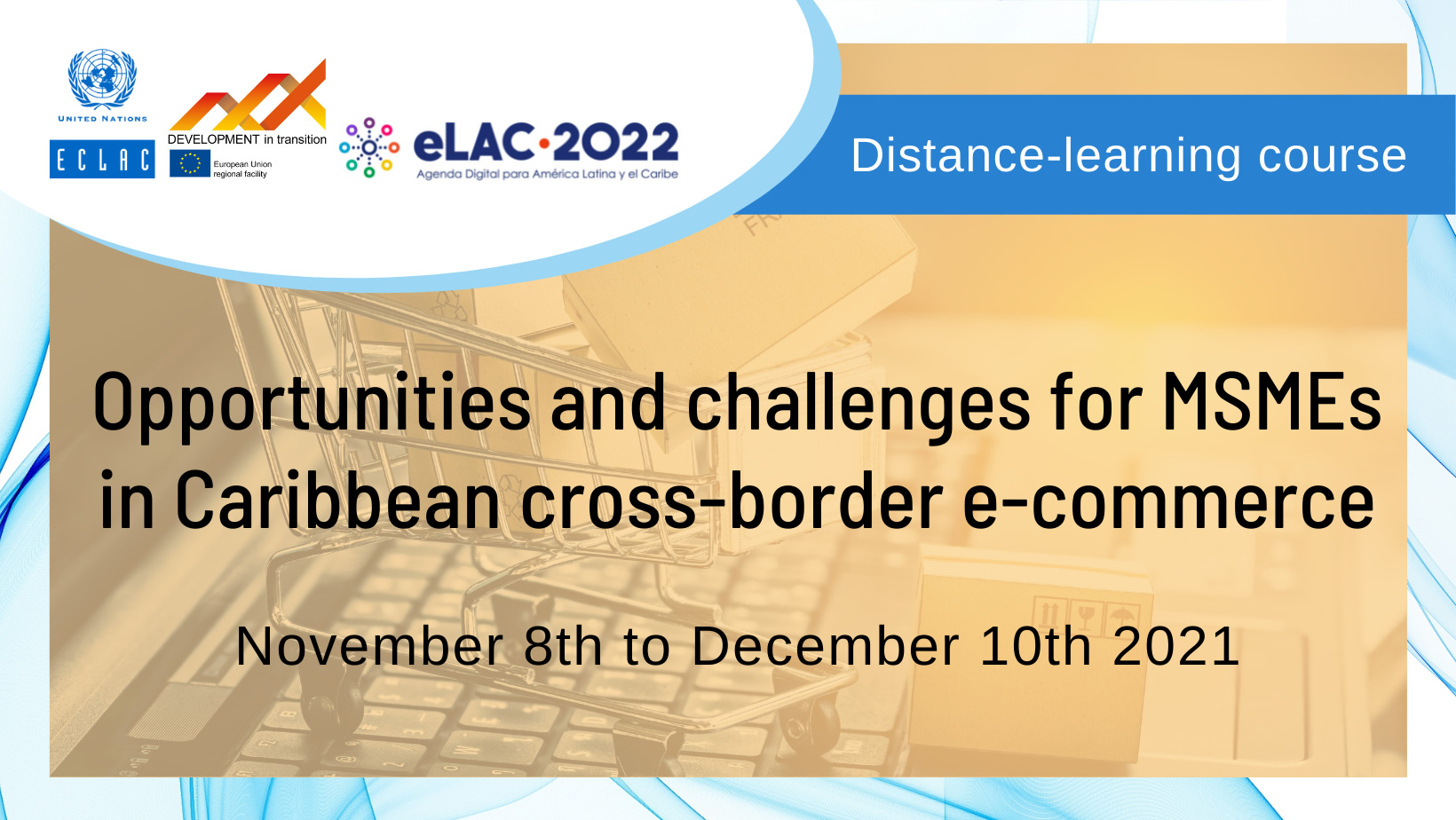Opportunities and challenges for MSMEs in Caribbean cross-border e-commerce
Work area(s)
The Course is organized by the Economic Commission for Latin America and the Caribbean (ECLAC).
Course information

Type of course
Training method
Course language
Geographic scope
Data
8 Nov - 10 Dez 2021, 16:00Date of registration
30 Set - 29 Out 2021Status
Financing type
Price
Financing
Target audience
THE GOAL OF THE COURSE
Training policymakers in good practices to improve thecapacities of MSMEs to participate in cross-border e-commerce.
SPECIFIC GOALS
- To learn about recent developments and trends indomestic and cross-border e-commerce particularly sincethe beginning of the pandemic and to examine thebarriers and challenges that MSMEs face in this type ofinternational trade.
- To understand the process of digital transformation anddigital capacity-building of MSMEs for the effectiveimplementation of cross-border e-commerce processes,systems and tools, along with the support thatgovernments can offer through public policies aimed atthis group of businesses.
- To gain greater awareness of the obstacles that MSMEsface and the best practices in logistics and tradefacilitation issues to speed up MSMEs' access tointernational markets through cross-border e-commerce.
- To understand the role of competition policy andcompetition laws to facilitate the entry and integration ofMSMEs as suppliers in regional and global value chainsand identify anti-competitive practices that restrict marketaccess.
- To identify critical regulatory elements for data protectionin the use of digital platforms and cyber security.
METHODOLOGY
Five modules will be delivered through distance-learningcourses utilising multimedia formats (reading guides, videotutorials, interviews) and interactive forms (virtual classesand discussion forums) to facilitate the understanding andlearning of the course material. Each module ends with asmall quizz. This course is taught in English.
DURATION OF THE COURSE
This course runs from November 8th, to December 10th, 2021. It has five weekly modules. The totalacademic load is approximately 25 hours. Eachmodule includes reading materials, viewing tutorialsand videos with interviews, participating in asynchronous virtual class, and conducting a briefexam with multiple-choice questions.
Programme
Module 1: Introduction
- Definitions and characterisation of domestic and cross-border e-commerce
- Main global and regional trends
- Participation of regional MSMEs in e-commerce
- The e-commerce institutional and public policy ecosystem
Module 2: Digital transformation and the role of e-commerce in MSMEs
- Introduction to digital transformation
- Strategies for the implementation of e-commerce in MSMEs
- Roles and processes to implementing cross-border e-commerce in MSMEs
- Digital tools for the implementation of cross-border e-commerce
Module 3: Logistical practices for agile cross-border e-commerce
- Introduction to cross-border e-commerce logistics
- Last-mile delivery: postal mail and courier companies
- Introduction to e-commerce regulation
- Single Windows (SW) in the development of cross-border e-commerce
- E-commerce in preferential trade agreements in LAC
Module 4: The strategic importance of data for cross-border e-commerce
- The importance of data for the development of MSMEs for access to digital platforms
- National regulatory frameworks for the storage, use, and transfer of data
- Data protection, privacy, and cybersecurity
- Integration of data as a strategic asset for businesses (marketing, CRM, ERP, …)
Module 5: Competition conditions and policy in cross-border e-commerce
- The importance of economic competition in the policy of support for MSMEs, particularly
- in times of pandemic
- Free-competition normative/regulatory framework
- Competition policy in the digital era
- The role of data, a strategic intangible asset for MSME businesses
- Competition policy, cross-border data flow, digital platforms, and data protection
Attachment(s)
Country(ies)
- Latin America and the Caribbean
Organized by
Economic Commission for Latin America and the Caribbean (ECLAC)
- https://www.cepal.org
- 56 222100000
Contact
Nanno Mulder
- nanno.mulder@cepal.org
- (56-2) 2210 2198
Georgina Nuñez
- georgina.nunez@cepal.org
Sheldon Mclean
- sheldon.mclean@eclac.org
Dillon Alleyne
- dillon.alleyne@eclac.org